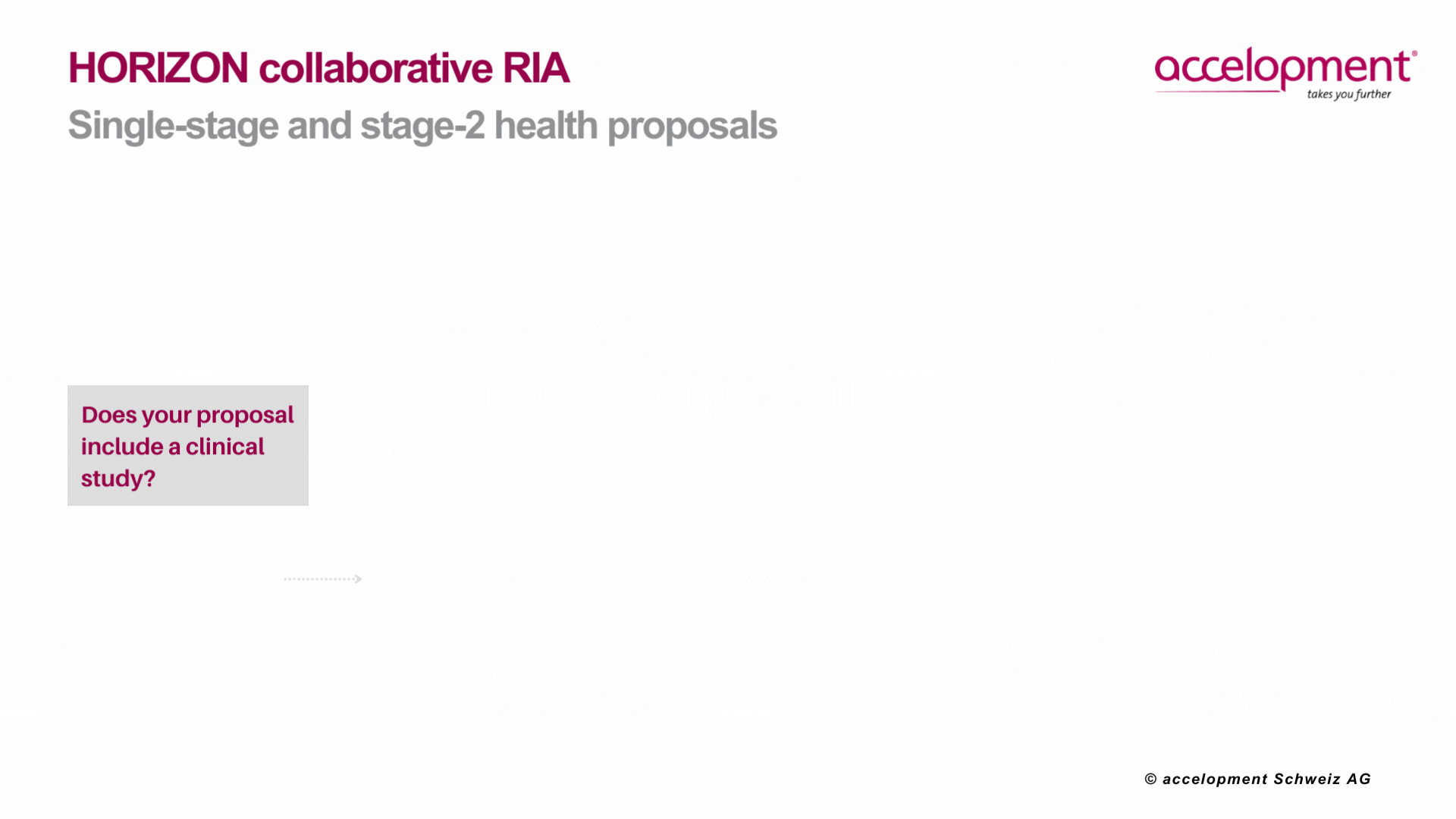Health proposals involving clinical studies – changes in the regulation and template
3rd February 2024 at 4:00 pm
On 24 January 2024, more than a thousand applicants received notifications regarding the invitation to submit their stage-2 proposals for Horizon Europe collaborative research and innovation (RIA) Health projects in Cluster 2. For proposals that involve clinical studies, the “Information on Clinical Studies” Template (V4.2 –01.04.2023; available under “Conditions and Documents” in the Funding & Tenders portal) might need to be submitted.
Statistics related to the submissions for the following nine stage-1 call topics were provided in one of our previous blog posts:
- HORIZON-HLTH-2024-STAYHLTH-01-02-two-stage: Towards a holistic support to children and adolescents’ health and care provisions in an increasingly digital society
- HORIZON-HLTH-2024-STAYHLTH-01-05-two-stage: Personalised prevention of non-communicable diseases – addressing areas of unmet needs using multiple data sources
- HORIZON-HLTH-2024-DISEASE-03-08-two-stage: Comparative effectiveness research for healthcare interventions in areas of high public health need
- HORIZON-HLTH-2024-DISEASE-03-11-two-stage: Pandemic preparedness and response: Adaptive platform trials for pandemic preparedness
- HORIZON-HLTH-2024-DISEASE-03-13-two-stage: Validation of fluid-derived biomarkers for the prediction and prevention of brain disorders
- HORIZON-HLTH-2024-DISEASE-03-14-two-stage: Tackling high-burden for patients, under-researched medical conditions
- HORIZON-HLTH-2024-TOOL-05-06-two-stage: Innovative non-animal human-based tools and strategies for biomedical research
- HORIZON-HLTH-2024-ENVHLTH-02-06-two-stage: The role of environmental pollution in non-communicable diseases: air, noise and light and hazardous waste pollution
- HORIZON-HLTH-2024-CARE-04-04-two-stage: Access to health and care services for people in vulnerable situations
Additionally, for the following five single-stage Health call topics with the same submission deadline on 11 April 2024 the clinical study document might also need to be prepared:
- HORIZON-HLTH-2024-TOOL-11-02: Bio-printing of living cells for regenerative medicine
- HORIZON-HLTH-2024-DISEASE-08-20: Pandemic preparedness and response: Host-pathogen interactions of infectious diseases with epidemic potential
- HORIZON-HLTH-2024-DISEASE-08-12: Pandemic preparedness and response: Maintaining the European partnership for pandemic preparedness
- HORIZON-HLTH-2024-IND-06-08: Developing EU methodological frameworks for clinical/performance evaluation and post-market clinical/performance follow-up of medical devices and in vitro diagnostic medical devices (IVDs)
- HORIZON-HLTH-2024-IND-06-09: Gaining experience and confidence in New Approach Methodologies (NAM) for regulatory safety and efficacy testing – coordinated training and experience exchange for regulators
For the successful ones and those preparing a single-stage submission, it is time to get ready all the required documents!
What is defined as a clinical study in Horizon Europe Cluster 1 Health projects?
As written in the “Information on Clinical Studies” Template, “a Clinical study covers clinical studies/trials/investigations/cohorts and means, for the purpose of this document, any systematic prospective or retrospective collection and analysis of health data obtained from individual patients or healthy persons in order to address scientific questions related to the understanding, prevention, diagnosis, monitoring or treatment of a disease, mental illness, or physical condition. It includes but it is not limited to clinical studies as defined by Regulation 536/2014 (on medicinal products), clinical investigation and clinical evaluation as defined by Regulation 2017/745 (on medical devices), performance study and performance evaluation as defined by Regulation 2017/746 (on in vitro diagnostic medical devices).”
This definition of a clinical study is rather broad, and the template needs to be used for clinical studies addressing scientific questions related to the understanding, prevention, diagnosis, monitoring or treatment of a disease, mental illness, or physical condition. These include clinical trials, clinical studies, investigations, cohorts, systematic prospective collection and analysis of health data, and retrospective analysis of health data obtained from individual patients or healthy persons. Hence, when the collection or analysis of human data or biological samples is envisioned, the template needs to be filled. Some examples would be:
- Phase I trial of a vaccination,
- Clinical Investigation of a medical device,
- New analysis of blood samples of a closed trial,
- Survey on well-being,
- Retrospective analysis of patient data.
Changes in the Clinical Study Template and Clinical Trials Regulation
In the new template, the list of topics for which it is mandatory has been eliminated and general scenarios where the document might be necessary are shown in the decision tree here instead:

It needs to be noted the template is referred to in the 14 call topics mentioned above, which hence fall into the category of topics that foresee a clinical study.
Additionally, on 31 January 2022, the Clinical Trials Regulation No 536/2014 entered into application and repealed the Clinical Trials Directive. As a result, as of 31 January 2023 all clinical trial applications in the EU will need to be submitted through the Clinical Trials Information System (CTIS).
Tips for filling in the template
The information included in the clinical study template impacts the scoring criteria under “Excellence” and “Quality and Efficiency of the Implementation”. We are happy to share a few tips for a complete and adequate clinical study template:
| Stick to the structure Address each section of the template. All chapters need to be filled out, even if they do not fit your specific clinical study. If one or more sections do not apply, leave these blank and provide the reason why these are not applicable. Do not leave any subchapter unanswered and do not delete it. | |
| Avoid unnecessary risks If your proposal does not contain a clinical study according to the definition of the EU, this should be apparent from your methodology chapter and in case of doubt we recommend to clearly sate why your research is not a clinical study, as has been recommended by a National Contact Point. | |
| Use one template for all studies, if more than one For each clinical study performed within the scope of the proposal, the information should be provided and compiled into one single document per proposal. If the proposal contains more than one (clinical) study, describe each of them separately (e.g. study A, Study B, etc.). | |
| Describe future relevant inputs When the requested information is not available (for example, the clinical study is planned for a later stage and will be based on or influenced by future results of other studies), describe the source and collection of the relevant input. | |
| Avoid repetition Information provided in the template does not need to be repeated anywhere else in the proposal, but it can be referred to and key facts such as recruitment targets, type of trial and others should be described in the main proposal document Part B. | |
| Less is more There are no page limitations to the template, but explanations should be as concise and brief as possible. |
The Health-NCP-Net 3.0 (HNN 3.0), an EU-funded consortium aiming to align and enhance the services of National Contact Points (NCPs) for the Health cluster, organised a webinar on the Annotated Horizon Europe Template “Information on Clinical Studies” together with the European Commission and has made an annotated template available. We recommend you to check out the webinar video, the webinar slides, and the comments in the PDF download.
In need of support and expertise for your Health proposal?
We at accelopment have been involved in several successful Horizon Europe RIAs which include clinical trials, such as COVend, MyPath and ThermoBreast, and the very recently started EU PAL-COPD and GLIOMATCH. These are in addition to our ongoing Horizon Europe Health projects EDiHTA and GENEGUT, and even more Horizon 2020 Health initiatives, such as AI-Mind, ENVISION, EURO-SHOCK, EXIMIOUS and VANGUARD. For these proposals we helped prepare the clinical study document as part of the proposal submission where necessary.
With many years of experience in EU-funded innovation projects, we will be happy to help you write a competitive single-stage or stage-2 Health application. If you would like us to help you write a competitive proposal or do a review of your proposal documents, get in touch with our experts below. You may even consider getting us involved as a beneficiary for project management or communication and dissemination support to strengthen the outreach of your project. We from accelopment can even be work package leader for dissemination and exploitation, including communication, as is the case in all of the above-mentioned projects. We are always interested in supporting new project ideas and consortia, and we look forward to hearing from you.


